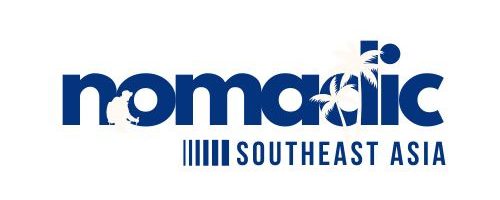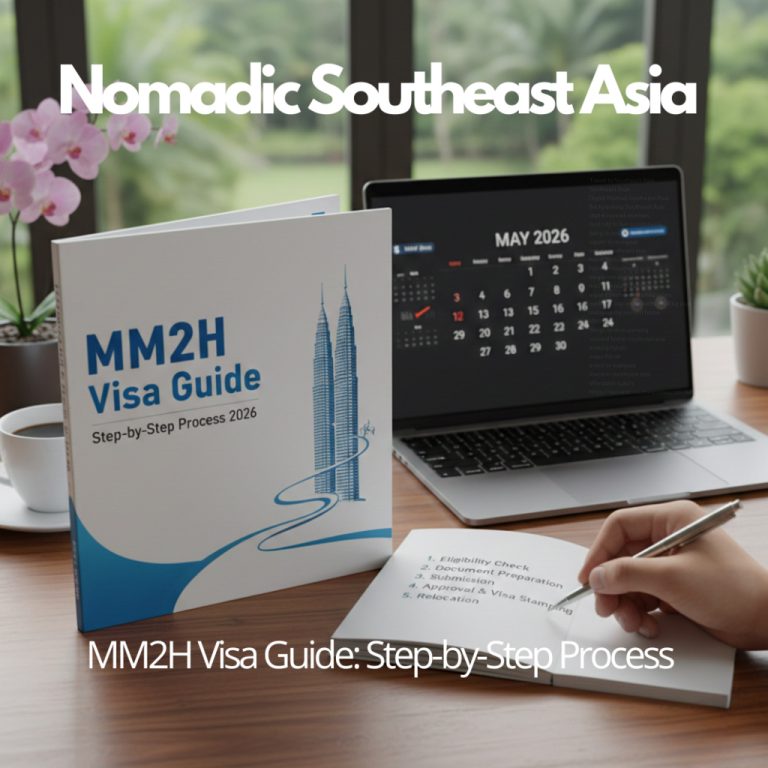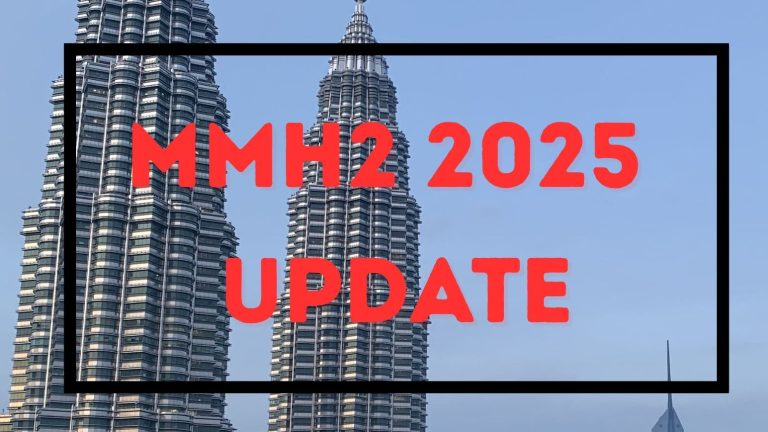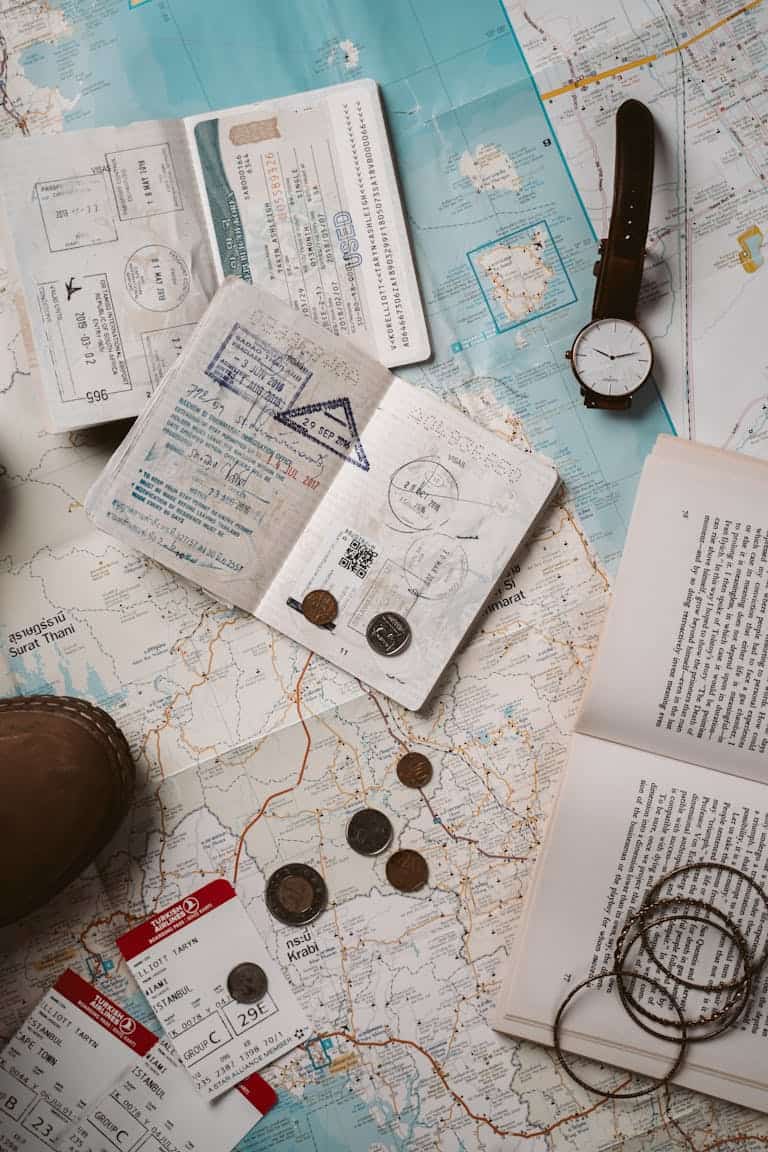Digital Nomad Malaysia: Ultimate 2025 Guide
Nomadic Southeast Asia contains affiliate links and is a member of the Amazon Services LLC Associates Program. If you make a purchase using one of these Amazon links, I may receive compensation at no extra cost to you. See my Disclosure Policy for more information.

Ready to trade your cramped office cubicle for a beachside café overlooking pristine Malaysian waters?
Dreaming of coding while surrounded by Kuala Lumpur’s glittering skyline, or taking Zoom calls from a UNESCO World Heritage site?
Malaysia isn’t just another pretty face in Southeast Asia’s digital nomad scene—it’s quietly become the region’s most compelling remote work destination, and 2025 might just be the perfect time to make your move.
This tropical tech haven offers something most destinations can’t: the perfect storm of cutting-edge infrastructure, wallet-friendly living costs, and cultural experiences so rich they’ll make your Instagram followers seriously question their life choices.
Get ready to reimagine what your professional life can look like when you blend productivity with pure wanderlust.
Let’s dive into why Malaysia isn’t just another pin on your digital nomad map—it’s your next career-defining adventure.
Key Takeaways
- Malaysia’s game-changing new visa options for 2025 (including the revolutionary DE Rantau Nomad Pass)
- Real costs of living as a digital nomad across different Malaysian cities
- Insider secrets on the best coworking spaces and hidden gems
- Practical advice for thriving in Malaysia’s unique multicultural environment
- Current visa requirements and application strategies that actually work
Why Malaysia is a Top Destination for Digital Nomads
Why Malaysia Dominates the Digital Nomad Scene in 2025?
The nation gives a special blend of modern facilities and deep cultural traditions, making it a perfect spot to stay and work from afar.
With its steady internet, low-cost way of living, and friendly people, Malaysia has all a digital nomad requires to succeed.
Sites like Nomadic Southeast Asia are awesome for locating tools and linking with other remote employees in the area.
The Infrastructure Advantage
Malaysia didn’t stumble into digital nomad success, it was built for it.
The country boasts Southeast Asia’s most reliable internet infrastructure, with average speeds hitting 100+ Mbps in major cities and 5G networks rapidly expanding across urban areas.
But speed is just the beginning. Malaysia’s internet reliability consistently outperforms regional competitors, meaning fewer dropped video calls and more confidence when promising clients seamless collaboration.
Key Infrastructure Highlights:
- Internet Speed: 100+ Mbps average in cities, 50+ Mbps in smaller towns
- 5G Coverage: Expanding rapidly in KL, Penang, and Johor Bahru
- Power Stability: 99.5% uptime in urban areas (crucial for those long work sessions)
- Backup Options: Widespread mobile hotspot coverage and affordable data plans
Now do you understand how Malaysia has fast turned into a top place for digital nomads, and it’s simple to understand why.
Malaysia: The Financial Sweet Spot

Here’s where Malaysia really shines—your money goes impossibly far without sacrificing quality of life.
We’re talking about a place where you can rent a modern one-bedroom apartment in the heart of Kuala Lumpur for $400-600 USD monthly, grab incredible street food for $2-3 per meal, and still have budget left over for weekend island hopping.
2025 Cost Breakdown (Monthly USD)
| Expense Category | Budget Range | Mid-Range | Comfortable |
|---|---|---|---|
| Accommodation | $300-500 | $500-800 | $800-1,200 |
| Food | $200-300 | $300-500 | $500-800 |
| Transportation | $50-100 | $100-150 | $150-250 |
| Coworking/Internet | $80-120 | $120-180 | $180-300 |
| Entertainment | $100-200 | $200-400 | $400-600 |
| **Total Monthly | $730-1,220 | $1,220-2,030 | $2,030-3,150 |
Cultural Richness That Actually Enhances Work-Life
Malaysia’s multicultural tapestry isn’t just tourist brochure fluff—it creates a genuinely stimulating environment for remote workers.
The blend of Malay, Chinese, Indian, and indigenous cultures means constant inspiration, diverse perspectives, and a food scene so incredible you’ll find excuses to take “lunch meetings” at different hawker centers.
The Productivity Paradox
Many nomads report being more productive in Malaysia than their home countries, despite (or perhaps because of) the rich cultural distractions.
The key? A society that naturally balances work and life, making it easier to focus during work hours and truly disconnect afterward.
Revolutionary Visa Updates for 2025: The Game Has Changed

Malaysia has transformed its approach to attracting digital nomads, introducing visa options that finally recognize the reality of remote work.
DE Rantau Nomad Pass: Malaysia’s Digital Nomad Visa
Launched in 2022 and significantly enhanced for 2025, the DE Rantau Nomad Pass is Malaysia’s direct answer to the global remote work revolution.
2025 Visa Options
| Pass Duration | Income Requirement | Cost | Target Audience | Key Benefits |
|---|---|---|---|---|
| 3-Month Pass | $2,000/month | $200 | Trial nomads, short projects | Quick approval, renewable |
| 12-Month Pass | $2,000/month | $500 | Established nomads | Tax benefits, family inclusion |
| 5-Year Pass | $4,000/month | $2,500 | High-income nomads | Maximum flexibility, investment options |
What Makes This Special:
- Work Flexibility: Work for any overseas client or employer
- Tax Advantages: Potential exemptions on foreign-sourced income
- Family Inclusion: Spouse and children can be included on longer passes
- Fast Processing: 2-4 weeks average approval time
- Renewable: Multiple renewal options available
Application Requirements:
- University degree or equivalent professional certifications
- Proof of remote work capability (contracts, portfolio, employer letter)
- Bank statements showing required monthly income
- Clean criminal background check
- Comprehensive health insurance
- Proof of accommodation in Malaysia
Traditional Visa Options Still Available
Tourist/Social Visit Pass (Visa-Free Entry)
- Duration: 30-90 days depending on nationality
- Best For: Testing the waters, short-term projects
- Cost: Free for most Western countries
- Renewable: Up to 3 months total stay
Malaysia My Second Home (MM2H) – 2025 Enhanced Version
The MM2H program underwent major revisions, creating a tiered system that’s more accessible for different income levels:
| Category | Age Requirement | Liquid Assets | Monthly Income | Fixed Deposit |
|---|---|---|---|---|
| Silver | 50+ years | $230,000 | $2,300 | $115,000 |
| Gold | 40+ years | $345,000 | $8,050 | $172,500 |
| Platinum | 35+ years | $460,000 | $9,200 | $230,000 |
MM2H Benefits:
- 10-year renewable residence
- Property purchase rights
- Tax exemptions on foreign income
- Family inclusion (spouse + children)
- Path to permanent residence
Malaysia’s Digital Nomad Hotspots: Where to Base Yourself

Kuala Lumpur: The Connectivity Capital
KL isn’t just Malaysia’s capital—it’s the beating heart of Southeast Asia’s digital economy. This is where serious nomads come to scale their businesses, not just maintain them.
Why KL Works for Digital Nomads?
- Internet Infrastructure: Best in Malaysia, with fiber reaching most neighborhoods
- Coworking Scene: 50+ professional coworking spaces
- International Environment: English widely spoken, global business mindset
- Transportation: World-class public transport system
- Networking: Largest expat and entrepreneur community in Malaysia
Top Coworking Spaces:
- Common Ground (Multiple Locations): Premium spaces with networking events, $150-200/month
- WORQ: Tech-focused community, excellent for startups, $120-180/month
- Colony: Creative hub with multiple KL locations, $100-150/month
- Regus: Professional setting, perfect for client meetings, $200-300/month
Neighborhood Guide:
- KLCC: Premium area, close to Petronas Towers, higher costs but maximum convenience
- Bangsar: Trendy expat area, great nightlife and restaurants
- Mont Kiara: International community, family-friendly
- Bukit Bintang: Central shopping district, perfect for short-term stays
Monthly Living Costs in KL:
- Studio apartment: $400-600
- One-bedroom: $600-900
- Two-bedroom: $800-1,200
- Coworking membership: $100-200
- Local transport pass: $25-40
Penang: The Cultural Productivity Paradise
George Town isn’t just a UNESCO World Heritage site—it’s become Southeast Asia’s most charming tech hub.
The combination of historical beauty, incredible food, and growing digital community creates an environment where creativity naturally flourishes.
The Penang Advantage:
- Cost Efficiency: 20-30% cheaper than KL while maintaining quality
- Cultural Immersion: Living heritage site with modern amenities
- Food Scene: Arguably Malaysia’s best street food destination
- Beach Access: 30 minutes to beautiful beaches
- Size: Walkable, bike-friendly, human-scaled city
Coworking and Productivity Spaces:
- @CAT Penang: Artistic hub in heritage building, $80-120/month
- Regus Penang: Professional space in Gurney Tower, $150-200/month
- Coffee shops: Many cafes welcome laptop workers, $3-5 daily coffee budget
Digital Nomad Neighborhoods:
- George Town Core: Heritage area, walking distance to everything
- Gurney Drive: Modern high-rises, beach proximity
- Tanjung Bungah: Beach communities, resort-style living
- Balik Pulau: Rural setting, perfect for writers and creatives
Monthly Costs in Penang:
- Studio apartment: $300-500
- One-bedroom: $450-700
- Two-bedroom: $600-900
- Coworking: $80-150
- Local transportation: $20-35
Langkawi: Island Paradise for Remote Workers

Langkawi proves you can have your tropical paradise and reliable internet too. This duty-free island has evolved from pure tourist destination to legitimate remote work haven.
Why Langkawi Works:
- Duty-Free Status: Cheaper alcohol, electronics, and luxury goods
- Natural Beauty: Pristine beaches, jungle, mountains
- Relaxed Pace: Perfect for reducing stress and increasing creativity
- Affordable Living: Island life without island prices
- Airport Connectivity: Direct flights to major Asian cities
Work-Friendly Establishments:
- Hotel coworking spaces: Many hotels offer day passes with workspace access
- Beach cafes: Growing number of laptop-friendly establishments
- Residential WiFi: Most accommodations now offer reliable internet
- Mobile coverage: Excellent 4G/5G coverage across the island
Accommodation Options:
- Pantai Cenang: Main beach area, most amenities and nightlife
- Kuah Town: Local experience, best value accommodations
- Datai Bay: Luxury end of the island, premium accommodations
- Pantai Tengah: Quieter beach area, good middle ground
Monthly Island Living Costs:
- Studio/small apartment: $250-400
- One-bedroom beachside: $400-650
- Villa with pool: $600-1,000
- Scooter rental: $60-80
- Daily meals: $10-20
Johor Bahru: The Singapore Alternative
JB has quietly become the smart nomad’s choice—all the benefits of Singapore’s business environment at a fraction of the cost, with the option to pop across the border for meetings or visa runs.
Strategic Advantages:
- Singapore Proximity: 30 minutes to Singapore by train or bus
- Cost Arbitrage: Live in Malaysia, work with Singapore clients
- Growing Tech Scene: Increasing number of startups and coworking spaces
- Infrastructure: Rapidly improving connectivity and amenities
- Gateway Location: Easy access to rest of Malaysia and Southeast Asia
Emerging Coworking Scene:
- Common Ground JB: Extension of KL’s premium brand
- WORQ JB: Tech-focused community space
- Local cafes: Growing laptop-friendly culture
Internet and Connectivity: The Technical Reality
Speed and Reliability by Location
| Location | Average Speed | 5G Coverage | Reliability Score | Mobile Data Cost |
|---|---|---|---|---|
| Kuala Lumpur | 120+ Mbps | Excellent | 9.5/10 | $15/month (unlimited) |
| Penang | 100+ Mbps | Good | 9/10 | $15/month (unlimited) |
| Johor Bahru | 90+ Mbps | Good | 8.5/10 | $15/month (unlimited) |
| Langkawi | 50+ Mbps | Limited | 7.5/10 | $20/month (100GB) |
Internet Provider Recommendations
For Apartments/Long-term:
- Maxis Fiber: Most reliable, available nationwide
- TIME Internet: Fastest speeds in urban areas
- Celcom: Good rural coverage
For Mobile/Backup:
- Maxis: Best overall coverage and customer service
- Celcom: Strong data packages and rural reach
- DiGi: Competitive pricing, good urban coverage
Backup Connectivity Solutions
Portable WiFi Devices:
- Rent from airports or telecom stores
- $3-5 daily rental rates
- Useful for travel between cities
Cafe and Public WiFi:
- Most cafes offer free WiFi with purchase
- Shopping malls provide reliable public access
- Coworking spaces offer day passes ($10-20)
Accommodation Strategies for Digital Nomads
Short-term Options (1-3 months)
Serviced Apartments:
- All-inclusive pricing with utilities and internet
- Hotel-style services with apartment space
- $600-1,200 monthly in prime locations
- Popular brands:
Airbnb and Short-term Rentals:
- Flexibility and variety of options
- Often better value for stays over 1 month
- Negotiate monthly rates directly with hosts
- Focus on properties with work-friendly setups
Medium-term Solutions (3-12 months)
Furnished Apartments:
- Local rental market offers many furnished options
- 1-3 month deposits typically required
- Use local agents or property websites
- Popular sites:
Coliving Spaces:
- Growing trend in KL and Penang
- Built-in community and networking
- All-inclusive pricing with coworking access
- Examples:
- Hmlet (Habyt)
- Coliwoo, local operators
Long-term Residence (1+ years)
Unfurnished Rentals:
- Best value for extended stays
- Build your ideal work environment
- 2-3 month deposits standard
- Negotiate lease terms for flexibility
Property Purchase (MM2H holders):
- Foreign ownership allowed with restrictions
- Minimum purchase prices vary by state
- Consider as investment rather than pure residence
- Consult local real estate lawyers
Healthcare and Insurance for Digital Nomads
Malaysia’s Healthcare System
Malaysia offers a dual healthcare system that works exceptionally well for digital nomads:
Private Healthcare:
- World-class facilities and English-speaking doctors
- Affordable compared to Western countries
- No appointment delays for routine care
- Popular hospitals: Prince Court, Gleneagles, Pantai
Public Healthcare:
- Extremely affordable emergency care
- Longer wait times but quality treatment
- Available to all residents and visitors
Insurance Recommendations
Travel Insurance (Short-term):
- World Nomads: Popular with digital nomads
- SafetyWing: Designed specifically for nomads
- Coverage: $50-100 monthly
Local Health Insurance (Long-term):
- Great Eastern: Largest local insurer
- AIA Malaysia: International standards
- Coverage: $100-300 monthly depending on age and coverage
Specific Considerations:
- Pre-existing conditions require disclosure
- Dental and vision often separate policies
- Mental health coverage increasingly available
Building Your Malaysian Digital Nomad Network
Professional Networking
Industry-Specific Groups:
- KL Tech Meetup: Monthly gatherings for tech professionals
- Penang Digital Hub: Regular startup and entrepreneur events
- Malaysia Fintech Association: Growing sector with opportunities
General Expat and Nomad Communities:
- Internations: Professional expat networking
- Hash House Harriers: International running/social group
- Facebook Groups: City-specific expat communities
Social Integration
Language Learning:
- Bahasa Malaysia classes available in major cities
- English widely spoken but local language appreciated
- Online options: Duolingo, local language schools
Cultural Activities:
- Festival participation (Chinese New Year, Hari Raya- Eid, Deepavali)
- Cooking classes featuring local cuisines
- Traditional arts and crafts workshops
Practical Daily Life Tips
Transportation Mastery
Kuala Lumpur:
- Touch ‘n Go card: Universal payment for all public transport
- Grab: Ride-hailing for convenience
- Public transport: MRT, LRT, and bus networks comprehensive
- Walking: Many areas very walkable with covered walkways
Penang:
- Rapid Penang buses: Island-wide coverage
- Grab: Available but limited compared to KL
- Bicycle: Flat terrain makes cycling popular
- Walking: George Town core very walkable
Inter-city Travel:
- Buses: Comfortable and affordable ($10-30 between major cities)
- Trains: Scenic routes, slightly more expensive
- Budget airlines: AirAsia for quick island hopping
- Car rental: Consider for exploring rural areas
Banking and Finance
Opening a Bank Account:
- Required documents: Passport, visa, proof of address
- Recommended banks: Maybank, CIMB, Public Bank
- Account types: Basic savings accounts available to tourists
- Online banking: Full digital services available
Money Management:
- Currency: Malaysian Ringgit (MYR/RM)
- ATMs: Widely available, low fees
- Credit cards: Widely accepted in urban areas
- Mobile payments: Touch ‘n Go eWallet, GrabPay popular
Legal and Tax Considerations
Tax Residency:
- 183-day rule determines tax residency
- Foreign income may be exempt depending on structure
- Consult local tax advisor for complex situations
- DE Rantau pass offers some tax advantages
Business Registration:
- Possible to register local business as MM2H holder
- Labuan offshore structures available for international business
- Professional advice essential for compliance
Seasonal Considerations and Timing
Weather Patterns
Dry Season (June-August):
- Best weather overall
- Higher accommodation prices
- Peak tourist season
Wet Season (November-February):
- Heavy rain but usually short periods
- Lower accommodation costs
- Fewer tourists, better local experience
Shoulder Seasons (March-May, September-October):
- Good weather with occasional rain
- Moderate pricing
- Ideal for first-time visitors
Festival Calendar
Major Festivals Affecting Business:
- Chinese New Year (January/February): Many businesses closed 3-7 days
- Hari Raya aka Eid (dates vary): Muslim celebration, 2-3 days
- Deepavali (October/November): Hindu festival, 1-2 days
Planning Around Festivals:
- Book accommodation early during festival periods
- Expect some service disruptions
- Great opportunities for cultural immersion
Common Digital Nomad Challenges and Solutions
Cultural Adjustment
Challenge: Understanding multicultural dynamics Solution: Embrace the diversity, ask questions respectfully, participate in cultural events
Challenge: Different business practices and timing Solution: Allow extra time for everything, build relationships before expecting quick results
Professional Challenges
Challenge: Time zone management with clients Solution: Malaysia is ideally positioned for both Eastern and Western clients (UTC+8)
Challenge: Reliable backup internet for important calls Solution: Multiple provider relationships, mobile hotspot backup, coworking space membership
Personal Challenges
Challenge: Social isolation, especially in the beginning Solution: Join coworking spaces, attend networking events, use social apps like Meetup
Challenge: Healthcare navigation Solution: Get comprehensive insurance, identify nearby private hospitals, keep emergency contacts
Future Outlook: What’s Coming for Digital Nomads in Malaysia
Infrastructure Developments
5G Expansion:
- Nationwide rollout planned by 2025
- Will significantly improve rural internet access
- Enhanced mobile work capabilities
New Coworking Spaces:
- Expansion beyond KL and Penang
- Smaller cities developing nomad-friendly infrastructure
- Government support for entrepreneurship hubs
Policy Developments
Visa Evolution:
- Potential expansion of DE Rantau program
- Possible family inclusion improvements
- Regional visa partnerships being discussed
Tax Incentives:
- Malaysia actively courting digital economy
- Potential new incentives for tech entrepreneurs
- Labuan jurisdiction offering offshore opportunities
Making Your Move: A Step-by-Step Action Plan
Phase 1: Research and Planning (2-3 months before departure)
- Choose your initial base city based on work requirements and lifestyle preferences
- Apply for appropriate visa—DE Rantau if you qualify, tourist visa otherwise
- Research accommodation options and make initial bookings
- Set up international banking and notify current banks of travel plans
- Arrange comprehensive travel insurance
Phase 2: Preparation (1 month before departure)
- Book flights and initial accommodation
- Download essential apps (Grab, Touch ‘n Go, local banking apps)
- Join expat Facebook groups for your destination city
- Research coworking spaces and arrange trial memberships
- Plan your first month’s activities to establish routine quickly
Phase 3: Arrival and Setup (First 2 weeks)
- Get local SIM card immediately upon arrival
- Open local bank account if staying medium-term
- Register with local embassy (recommended for longer stays)
- Explore neighborhoods and finalize accommodation
- Join coworking space and start networking
Phase 4: Integration (Weeks 3-8)
- Establish work routine that accounts for local culture and timing
- Build professional network through coworking and industry events
- Develop social connections beyond just work relationships
- Explore beyond your base city to understand Malaysia’s diversity
- Plan visa extension or renewal if needed
Your Malaysian Adventure Awaits
Malaysia in 2025 offers something remarkable for digital nomads—a chance to upgrade your lifestyle without compromising your career growth.
Whether you’re drawn by the financial advantages, the cultural richness, or simply the opportunity to take Zoom calls with a backdrop of tropical paradise, Malaysia delivers on its promises.
The country’s strategic investments in digital infrastructure, combined with progressive visa policies and an increasingly nomad-aware business environment, create conditions that support not just working remotely, but thriving remotely.
Remember:
- Start with the DE Rantau Nomad Pass if you qualify—it’s a game-changer
- Choose your base city carefully based on your work requirements and lifestyle preferences
- Invest time in building both professional and personal relationships
- Embrace the multicultural environment—it’s Malaysia’s greatest strength
- Plan for seasonal variations and cultural events
- Keep flexibility in your plans—Malaysia has a way of surprising visitors
Ready to make the leap? Malaysia isn’t just another destination on the digital nomad trail!
It’s a place where you can build something lasting while experiencing daily adventures that make your former office life seem like a distant memory.
The infrastructure is ready, the community is welcoming, and the government is actively encouraging your presence. The only question left is: when are you making your move?
Safe travels, and welcome to your new Malaysian chapter! 👋 🇲🇾
Frequently Asked Questions (FAQs)
What are the best cities in Malaysia for digital nomads?
The finest cities for digital nomads in Malaysia consist of Kuala Lumpur, Penang, and Langkawi. Kuala Lumpur presents a lively city setting with many coworking spots, while Penang is famous for its deep cultural history and lively food scene. Langkawi gives a more laid-back island vibe, ideal for those wanting to chill after work.
How much does it cost to live as a digital nomad in Malaysia?
The price of living in Malaysia is quite low compared to several Western nations. On average, a digital wanderer can anticipate spending between $800 and $1,500 each month, based on lifestyle options, housing, and eating choices. This covers rent, meals, travel, and fun activities.
What visa options are available for digital nomads in Malaysia?
Digital nomads can enter Malaysia on a tourist visa, which usually allows for a stay of up to 90 days. For longer stays, the Malaysia My Second Home (MM2H) program is a great choice, providing a long-term visa for those who fulfill certain financial needs.
Are there good coworking spaces in Malaysia?
Yes, Malaysia has a range of coworking spaces, particularly in big cities such as Kuala Lumpur and Penang. Well-liked choices include Common Ground and WeWork, which offer cozy work settings, fast internet, and chances to connect






